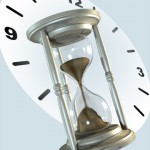 What is a diary?
What is a diary?
Traditionally diaries have been for recording history. Many books have been written as a result of people keeping diaries of their daily events and these have given us fascinating insights into life and culture in different eras and nations.
 Elizabeth Fry
Elizabeth Fry
I have just been reading a biography of the great prison reformer in the UK, Elizabeth Fry, who lived at the end of the 18th and beginning of the 19th centuries. Without her diaries we would know far less about her. She was clearly a formidable woman – perhaps I should not admit that she was my great great great grandmother!
But diaries have changed and now tend to be looking forward. They are the most common vehicle for making appointments, planning holiday dates and so on. But the basic diary is insufficient for what I have been teaching and we need to explore other options. First however, I would like you to watch this video. Click on the picture.
Personal Organiser or PDA?
The two options I mention are the Personal Organiser, which usually implies a paper system of which Filofax and Daytimer are two well known examples, and the Personal Digital Accessory (PDA), which is electronic. There are many varieties of PDA but the iPhone and its derivatives seem to be sweeping the market.
Each variety has advantages and disadvantages. These relate to cost (paper is cheaper), capacity (PDAs have huge memories), size (PDAs are much smaller and lighter) and so on. It is probably a ‘no-brainer’ to realise that the flexibility and size of the PDA makes it a very attractive option if you can afford it. But for the purposes of this training series I am going to illustrate from a Daytimer which is what I used to learn Time Management, although not using the system taught by Daytimer.
Once you have mastered the principles I am teaching and have adopted them for yourself it is relatively easy to convert to an electronic system. But, with the variety of PDAs on the market it would not be easy to use one for this teaching as they have so many different characteristics and options. Also, not everyone can afford or have access to one – I am aware that these blogs are being read in many less developed economies. So, from now on I will base the teaching on Personal Organisers, but that does not mean that if you already have a PDA you have to drop out of the scene! From time to time I will suggest how to adapt a particular feature to a PDA, remembering that you may need to be a bit creative yourself.
The Benefits
There are various benefits from using an Organiser. In summary some are:
• Easy accessibility.
• Planning details are always with you.
• “Catch all” for “do its”.
• Appointments are to hand
• Information is available on all major areas of life whether home or work.
• Assists goal planning.
• Gives peace of mind (though not as mush as the gospel!)
Peace of mind
I will unpack each of these in future blogs but for now let me just reflect on ‘peace of mind’. Early in this series I made a promise – if you precisely follow the principles and guidelines I am teaching you will never miss another appointment. Now surely, in itself, that brings peace of mind! But there are other contributors to such an assessment. For example, you will never again need to say ‘Where did I leave the address book?’ or ‘My husband/wife has mislaid the family calendar’. Provided you are sufficiently reliable not to lose your PO or PDA those frustrations are a thing of the past. (But if you have a PDA it is worth backing it up at least once per week just in case!)
Next time we will look at how to layout your Organiser and also consider some basic ground rules that I recommend.

